- Home
- L. M. Montgomery
A Name for Herself Page 21
A Name for Herself Read online
Page 21
I think it would be a splendid idea to have top bureau drawers fitted out with handy sets of pigeon-holes which would keep the little trifles in place and prevent laces from getting mixed up with ribbons and belts and ties from becoming interlaced. Things keep fresh and smart so much longer when they are kept neatly folded among their own kind.
As the folks who build bureau drawers have not as yet awakened to this long felt want, however, Theodosia has substituted a system of boxes. Her top bureau drawer is a model of neatness. It is filled with a layer of card-board boxes of all shapes and sizes from the long oblong one where her veils are folded to the tiny round pill box in which she keeps odd buttons and hooks and eyes. Everything is kept in its own place and this is not difficult since its place is always there ready for it and is never usurped by anything else.
I have tried to coax Polly to adopt this plan. But there are some people you can’t reform!
Laura was visiting us last week and the first morning we had eggs for breakfast. After she had eaten hers she made a tiny hole in the bottom of the shell. When I asked her why she said she really didn’t know; she always did it, that was all.
Ted rose to the occasion. Once in a while Ted shows himself to be possessed of any amount of queer odds and ends of knowledge. You’d be surprised.
“That,” he said, “is really a superstitious custom which the old Romans carefully observed. People used to believe that if a witch found an empty egg-shell lying about she would make use of it as a boat and cause terrible storms and shipwrecks. If you punch a hole in it of course you render it unseaworthy.
“The Japanese never leave egg-shells lying around because they believe that anyone who steps over them will go insane. In some parts of England there is a belief that if you burn egg-shells the hens will stop laying. It is also very unlucky to dream about eggs.”
One of the latest fads in smart society is a gold and pearl net for the hair. These are very beautiful with my lady’s glossy curls gleaming through their meshes. The idea is an old one, for centuries ago high born Spanish dames confined their locks under jewelled nets.
They are both becoming and effective. One very pretty one has fine threads of gold woven in a diamond shaped mesh over softly puffed golden hair. Polly has one of small pearl beads and it is very fetching.
[The Great Art of Letter-Writing]
Monday, 21 April 1902
WHAT WITH DANCES, OPERAS AND CONCERTS HALIFAX has been quite gay recently. And when the fine days did come after all the rain weren’t they hugely appreciated? We are creatures of the sun, we men and women, and come to our best only in his smiles. But this is enough to say about the weather. I’m in duty bound to mention it, you know. There is no luck for anyone who flies in the face of old traditions too openly.
The other evening around the table we amused ourselves by telling stories about the “funny sayings” of children. We each had to tell one story that we had heard, read or invented – it didn’t make any difference which. But if it were the last it had to be good enough to be – like beauty – its own excuse for being.242
Ted led off with a story he had heard somewhere. A new baby had arrived at a certain household and the older brother was looking at it gravely. “Where did it come from, Aunty?” he asked. “God sent it,” replied Aunty gently. “I don’t believe God did,” said the older brother gravely. “I think the milkman brought it.” “Why the milkman?” queried Aunty. “Because,” said the child, “it says on his cart ‘Families supplied.’”
Polly followed this up with a gruesome anecdote about two little lads who were discussing their love for their father and mother. One couldn’t live without “muvver.” If she died he would go and dig her up. But the other had a better plan. “If favver dies I’ll have him stuffed.”
Theodosia told of a prayer she had once heard a little girl say reverently. “Oh, please, dear God, make me pure, absolutely pure as Epps’ cocoa.”243
This reminded me of another story I had heard about a little boy whose father had gone to the city, promising to bring him a toy train when he came home. Very sincere was the small chap’s prayer. “God bless papa and bring him home safely – and – and – his luggage.”
Aunt Janet finished up by telling of a little six-year-old cousin of hers who used to pray “God bless grandmamma and help her to speak the truth,” when he wanted a special blessing for his saintly grandmother.
Theo flung down a letter the other day with a rather disgusted expression upon her face.
“I sometimes wonder why Gertie writes letters at all,” she said. “She puts so little in them. I don’t see how it is. Personally Gertie is one of the brightest and most entertaining girls I know and yet her letters are dry as chips.”
Letters very often fall short of what they ought to be and indeed, of what they might be if the writers took a little more trouble over them. We have all got letters that were disappointing in their brevity and dullness. And again we have had letters that for interest and brightness were the wells of water in a thirsty ground.244
It is a good plan when writing a letter to keep strictly in mind, as far as you can, what will interest your friend and not simply what interests you.245 Don’t fill up your letter with scraps of news about people and places unknown to her unless they are entertaining apart from their personal interest. Write to her as you would talk to her. Tell her all the harmless gossip – there is such a thing, you know – she would like to hear and don’t write anything that you think might hurt or worry her in any way, unless it is really necessary. Don’t gush – that is if you are over eighteen. If you are under that age it is no use telling you not to. School girls have to gush and write sentimental letters to their darling chums vowing eternal friendship and all that sort of thing. It’s a phase they have to pass through. And how silly those soul outpourings do read, years afterward, when you read them over in cold blood.
Again, never write a letter when you are angry. Or if you do, don’t mail it for twenty-four hours. Then read it over and put it in the waste basket. It may save you a heartache in after years. Remember that “written words remain.”246
Above all bear in mind Sam Weller’s immortal dictum: “She’ll vish there was more and that’s the great art of letter-writing.”247
Nowadays when real lace is so extensively worn it is well to be up in lace lore. Here are a few points I have gleaned here and there. All “real” lace is hand-made, of course, and is easily detected from the machine woven imitation because the meshes in real lace are generally irregular while the machine made is uniform in weave.
There are only two kinds of real lace – “pillow” lace, which is made with pins and bobbins, and “needle” lace with which we are all familiar. Needle lace has a more distinctive outline than pillow lace, which has a flat pattern and a soft, smooth outline. Some of these pillow laces are exquisitely beautiful.
Almost fabulous prices have been paid for laces. Forty pounds an ounce is the largest sum ever given for lace. The art of lace making is very old and has a glamor of romance about it. It is an essentially feminine art and it is a rare woman who does not love the making of it as well as the wearing.
Nowadays the voice of the housecleaner is heard in the land.248 I have heard men saying that there is no real need of this periodical overturning – that it was just a notion the women have. When the men talk about anything they don’t understand they are too funny for words. Polly and Theo and Aunt Janet and I have to sit on Ted systematically every spring or there would be no living with him at all.
It’s a relief to dig out old corners and weed out the accumulated rubbish of months. You’re sure to find a lot of things you’ve looked for high and low and given up as lost. And there’s fun in shifting the furniture about and figuring out new ways to hide old holes in the carpets. Of course there are drawbacks – but isn’t the same to be said about most mundane things?
[The Great Art of Packing a Trunk]
Monday, 28 April 1902
MARIAN DROPPED IN THE OTHER EVENING TO TELL US a harrowing tale of her recent “flitting” from one boarding house to another.249
“I’m tired to death,” she said pathetically. “For the past three days I have felt like the man without a country – or was it without a shadow? I forget which.250
“First thing I had to pack up. I hate packing. But this time I was determined to be systematic and thorough. I hunted out a newspaper article on packing a trunk and started to follow its instructions. The first thing, it said, was to carefully sort out all your belongings into piles and put like with like. Well, I did this. The bed was the only place I had to put them and I piled them there. I meant to keep the piles separate, but when I got through everything seemed to be mixed up together and the things that I wanted to pack first were at the very bottom of the pile.
“I discarded the newspaper clipping in despair and went at the job in my own old abandoned way. I got it done in time – after a fashion. Then I called Winnie and Mab in and they sat on the trunk while I locked it.
“Of course, as soon as this was done – and I hope you’ll never be as tired and dusty as I was, Cynthia – I began to discover that I had packed a lot of things that I needed at the very bottom of the trunk – my brush and comb, for instance, and my dressing jacket. Also, I couldn’t find my soap. I had to unlock the old thing and poke and dive into it for half an hour before I found all I wanted. I would get hold of something that felt like what I was looking for and pull it up and it would be something else. No, Ted, I did not swear. You know I would not do such a thing. But Mab said my looks were profane.
“Anyhow I lived through it and got moved. Then came the unpacking. Girls!!! You’d have thought I’d begun at the top of that trunk and packed down.
“My oil stove was on top of my second best hat. To save space I had put all my handkerchiefs in a little saucepan I use for making candy in and I rolled an organdy shirt waist round it. But I had forgotten that the bottom of it was all smoky and that shirt waist is ruined. Then I’d packed a bottle of shoe polish upside down and it leaked all through my very spiffiest whitewear. It’s no wonder I look like a wreck. My mind won’t recover its tone for a month.”
Although Marian made such a poor use of her newspaper article perhaps others will do better. So here are a few new-old hints for the use and behoof of those who are about to “flit.”
It is best to begin with boots, stockings and heavy underwear which should be laid at the bottom of the trunk. The golden rule in packing is “Take care of the corners and the centre will take care of itself.”251 Cuffs, collars, gloves, ties and hankys should all be packed together and the trays are the best place for them. All sleeves and bows of dresses should be stuffed with tissue paper or – if you are stinted for space – you can use rolls of fine underwear for stuffing the sleeves. In packing skirts fold them three or four times from the centre to the front. Generally it will be necessary to turn up the skirt at the bottom which should be done after the lengthwise folds are made. Even if you are travelling only a short distance do not leave your handbag out of calculation. It ought to contain soap and a towel, a wash cloth, nail brush, comb and hair brush, clothes and tooth brush, pins, needles, thread, thimble and scissors, two or three handkerchiefs and collars. So fortified you could live for a few days in comparative comfort even if your trunk mistrysted. If you take more than one trunk it is a good plan to list all the articles in each and tack the list inside the cover.
We hear a good deal from time to time about the miserable condition of women in China, especially in regard to their subservience to their husbands. Well, doubtless they have grievances; but I suspect that the theoretical authority of the Chinese husband is sometimes much greater than the practical authority. Even in Canada – nay, right here in Halifax – brides vow at the altar to obey their husbands.252 But do they always do it? Place aux hommes!253
Apropos of China, here is a story I read the other day which is a favorite “joke” in the flowery kingdom.
Ten henpecked husbands resolved to form a society to resist the impositions of their wives. The ten wives heard of the plan and while the meeting for organization was in progress entered in a body. Nine of the rebellious husbands incontinently bolted, but the tenth one retained his place quite unmoved by the frightful apparition. The ten ladies, merely smiling contemptuously on the one man left behind, returned to their homes satisfied with the success of their raid.254 The nine husbands thereupon returned and resolved to make the heroic tenth the president of the society. When they went, however, to inform him of the honor it was found that he had died on the spot of fright.
Lives there a woman who doesn’t love jewels? If there be such a weird, unfeminine creature, out on her!
Theo had an opal ring given her the other day as a birthday gift. We all told her that opals are unlucky, but Theo flouts all such superstition disdainfully and wears her opals gaily.
There is another superstition connected with the opal. It is said that it glows bright when the love of the giver for the wearer remains constant and true and grows dim when it falters or fails.
To my thinking, opals are the most beautiful jewels in the world. They are pearls with souls.
Legend says that pearls are the crystallized tears of seanymphs. Hence the superstition that they bring sorrow to their wearers. This legend, like many others, is more poetical than true. Pearls are really the tombs of small marine worms known as “distomes.” Ordinarily the pearls decay in a year’s time releasing the encysted creature. But if the distome dies the pearl will go on enlarging until it is of great value. That an insignificant worm should have a coffin worth thousands of dollars is really as poetical an idea as the old one about the nymphs. Colored pearls are valuable for their rarity. Fabulous prices are paid for these, especially for the pale green.
A diamond is simply a “spark of pure carbon.” We think of diamonds as colorless and transparent, but they occur frequently in many colors, and there are black diamonds which are very valuable. The diamond is emblematic of innocence and is the birth-stone of April.
The turquoise is for December. An old legend relates that it fades when its wearer is ill and dies when he is attacked by an incurable malady. If your birthday is in December wear a turquoise and you need never fear falling off a high place. It is also said to be a protection against contagion. This would be a pleasanter safeguard than vaccination, but I suspect its efficiency depends a good deal on the “faith” of the wearer.
[Jonah Days]
Monday, 5 May 1902
LAST WEEK THE VOICE OF THE GRADUATE WAS HEARD IN the land.255 Polly and Theo and I took in all the convocations, of course. Theodosia is interested in the Higher Education of Women – spelt with capitals – and Polly had two or three of the graduates on her calling list. When we got home from the Academy of Music on Tuesday we talked it over.
“Didn’t Jack look splendid,” sighed Polly. “There’s no use in talking, he is very handsome and distinguished-looking. And those bachelor gowns are really very becoming to girls. They almost make me wish I had gone in for an Arts course.”
“I wonder if any of them know how to cook,” said Ted – who has a habit of saying things like that.
“Why shouldn’t they?” demanded Theodosia indignantly. “Is a knowledge of Greek going to prevent anybody from cooking? If so, what did the people who used to talk Greek live on? Did they eat things raw because the women knew Greek? A man can eat a dinner no matter how many dead languages he knows; why can’t a woman cook it under the same circumstances. You men are always thinking about your stomachs.”
“It ill becomes a man who once made a certain historic gingerbread in this household to rail at the possible culinary shortcomings of others,” I said severely.
Ted looked at me with an “et tu, Brute,” expression and said no more.256 He might have stood out against Theodosia’s broadly chopped logic, but my reference wilted him.
You see it happened this way.
Ted used to think he knew all about cooking because, once upon a time, he made some pancakes and nobody died after eating them. On the strength of this he used to criticize the things Polly and Theo and I cooked with the lofty air of one who knows it all. We didn’t mind much. You have to humor the men in some respects, you know. And after all, Ted is a good soul.
One day I made a gingerbread and it was more or less a failure – flat in the middle and hilly around the edges – you know the kind. Ted is fond of gingerbread and he was nasty about this. He made some sarcastic remarks that hurt my feelings and I retorted by telling him to make better gingerbread himself if he could.
Ted never took a dare in his life and next day he put on one of Aunt Janet’s aprons and he made the gingerbread for tea. The joke of it was that he was real deft and knacky about it, too. You’d have thought he had been cooking all his life. The cake came out of the oven as light and puffy as golden foam. Ted beamed and you’ve no idea how silly I felt.
“If you like, Cynthia, I’ll give you a few lessons in the art of making good gingerbread,” said Ted condescendingly.
But I had my revenge when we tried to eat that gingerbread. Ted had flavored it with a big spoonful of mustard instead of ginger!
He hasn’t offered to give me lessons in cooking since. If you want to see Ted wither up and shrink visibly before your eyes just say “gingerbread” to him.
Polly made a queer mistake once. It was long ago and she is under the fond delusion that we have forgotten it. But nobody who tasted that cake ever could forget it.
We had company for tea that evening and Polly made a cake for them in a hurry. It looked very nice when she put it on the table – the golden slices tipped with icing, nestling among the flutes of a cobweb-like doily. Polly passed it around proudly, remarking – probably for the benefit of her particular young man pro tem,257 who was present – that she had made it herself. We all took a piece and each took a big, brave bite.

 Mistress Pat
Mistress Pat A Tangled Web
A Tangled Web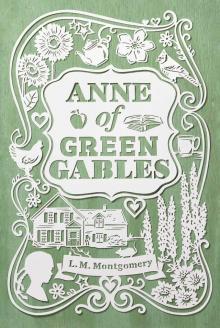 Anne of Green Gables
Anne of Green Gables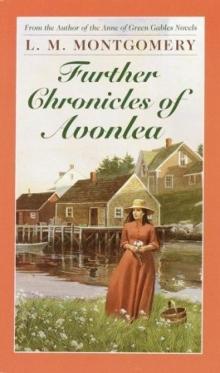 Further Chronicles of Avonlea
Further Chronicles of Avonlea Magic for Marigold
Magic for Marigold Pat of Silver Bush
Pat of Silver Bush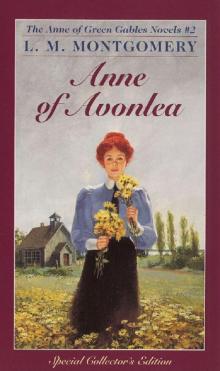 Anne of Avonlea
Anne of Avonlea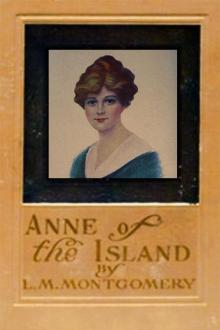 Anne of the Island
Anne of the Island The Blue Castle
The Blue Castle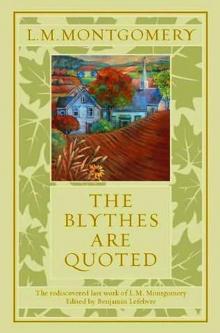 The Blythes Are Quoted
The Blythes Are Quoted Emily of New Moon
Emily of New Moon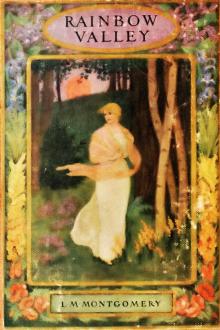 Rainbow Valley
Rainbow Valley Rilla of Ingleside
Rilla of Ingleside 07 - Rainbow Valley
07 - Rainbow Valley Anne of Green Gables (Penguin)
Anne of Green Gables (Penguin) Emily Climbs
Emily Climbs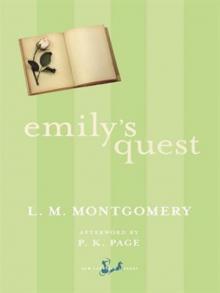 Emily's Quest
Emily's Quest A Name for Herself
A Name for Herself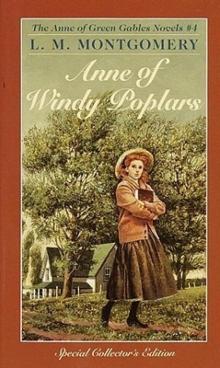 Anne of Windy Poplars
Anne of Windy Poplars The Complete Works of L M Montgomery
The Complete Works of L M Montgomery The Story Girl
The Story Girl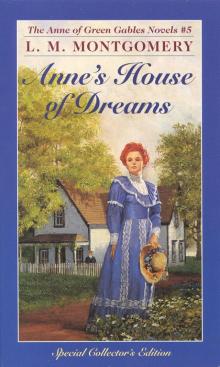 Anne's House of Dreams
Anne's House of Dreams Jane of Lantern Hill
Jane of Lantern Hill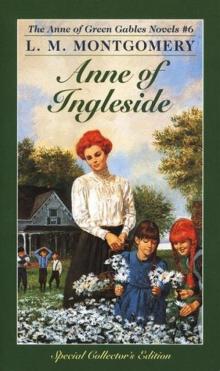 Anne of Ingleside
Anne of Ingleside